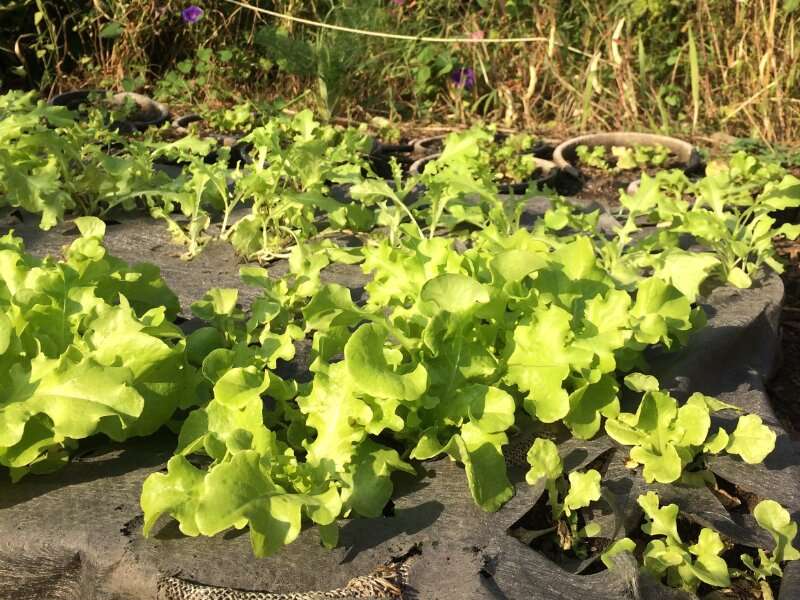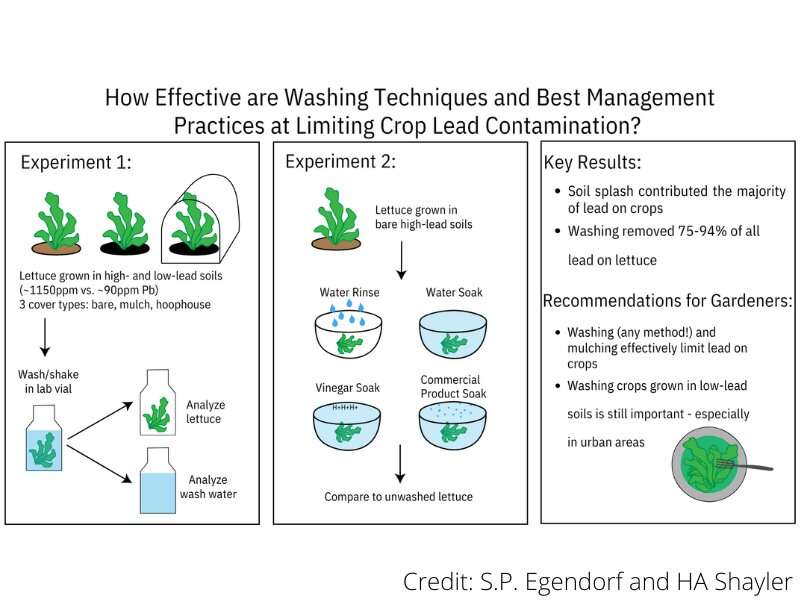Study finds washing effectively removes lead from vegetables grown in urban soil

Urban gardens offer many benefits for individual health, communities, and ecosystems. They promote sustainable agriculture, reduce food transportation costs, and reduce water runoff. However, urban gardeners also face several challenges, one of which is dealing with contaminants like lead.
Lead is a neurotoxin that can damage multiple organ systems. "It is incredibly important to know if urban gardeners are being exposed to lead when they consume their produce," says Sara Perl Egendorf, a researcher at Cornell University.
Egendorf is the lead author of a new study that shows washing lettuce grown in urban gardens can remove most lead contamination. The study was published in the Journal of Environmental Quality, a publication of the American Society of Agronomy, Crop Science Society of America, and Soil Science Society of America.
Urban gardeners grow a wide variety of crops. This study focused on lettuce because predicting lead levels in leafy greens—like lettuce—can be tricky.
"Leafy greens often have intricate surfaces," says Egendorf. These surfaces can trap lead-containing soil particles that may be hard to wash off. "We really didn't know if washing lettuce could effectively remove contaminated soil."
Egendorf and her colleagues grew lettuce in an urban community garden in Brooklyn, New York and in a rural field site in Ithaca, New York. The lettuce was grown in soils containing either high or low levels of lead. The researchers tested different washing strategies: rinsing with tap water, soaking in water, soaking in vinegar, or soaking in a commercial vegetable wash solution.

The conclusion? Washing effectively removed lead contamination from lettuce leaves. "All the wash methods we tested worked," says Egendorf. "We also found that washing lettuce grown in low-lead soils was still important to reduce lead levels before consuming." Some unwashed lettuce grown in low-lead soils had elevated lead levels. All unwashed lettuce grown in high-lead soils had lead levels above government standards. Washing reduced lead levels to below these guidelines in all cases.
The study also showed that management practices like mulching and using hoop houses, or small greenhouses, are effective at reducing lead contamination on lettuce by keeping contaminated particles away from the plants.
"Lettuce grown in bare soil can be contaminated with lead in different ways," says Egendorf. The plants can absorb small amounts of lead through their roots. Soil particles contaminated with lead can splash on to the plants, during watering for instance. Finally, lead particles from pollutants in the atmosphere can land on the lettuce leaves. The good news is that much of this lead can be washed off. According to this study, 97% of lead from splash and 91% from atmospheric deposition were washed off lettuce.
Mulching the soil around lettuce can prevent lead-contaminated soil particles from splashing. Hoop houses can protect plants from lead contaminants in the atmosphere or dusts being blown by wind. Both practices reduce lead contamination of lettuce grown in urban gardens. "We found that these management practices are effective at preventing soil splash and lead deposition on plants," says Egendorf.
Combining effective management practices and washing gave the best results. For example, mulching alone reduced lead levels in unwashed lettuce by 76%. Washing alone reduced lead levels by a further 85%. Together, mulching and washing reduced lead levels found on lettuce by almost 97%.
Reducing exposure to lead is of the utmost importance, says Egendorf. Children are especially at risk from lead exposure because lead can cause major harm to brain development. In adults, long-term exposure to lead can cause many issues, which include kidney damage and a decline in cardiovascular and nervous system health. Lead exposure has been shown to cause more than 400,000 premature deaths per year in the United States.
Egendorf and colleagues are sharing their findings with organizations, agencies, and extension specialists. "We want to encourage urban gardeners to keep doing their important work," says Egendorf. "We also want to make sure they have access to strategies for safe and effective gardening."
More information: Sara Perl Egendorf et al, Effectiveness of washing in reducing lead concentrations of lettuce grown in urban garden soils, Journal of Environmental Quality (2022). DOI: 10.1002/jeq2.20357
Provided by American Society of Agronomy




















